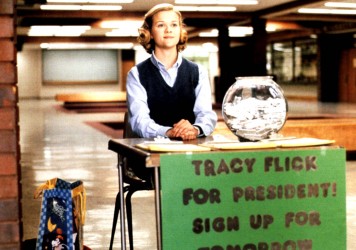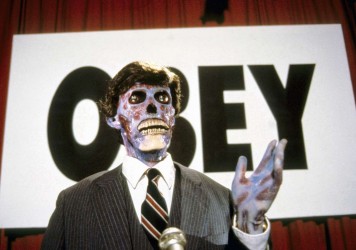
Twenty years ago, Tracy Flick launched her candidacy for student president and, consequently, a litany of real-world comparisons. Tracy, the brass-necked wiseacre at the heart of 1999’s Election, brilliantly played by Reese Witherspoon, became a perennial teen movie archetype and easy shorthand for ruthless ambition. American voters seemingly see her in Hillary Clinton, Elizabeth Warren, Kirsten Gillibrand; in any blonde, white woman running for President. It’s developed into an insult. Being compared to Tracy Flick is certainly no compliment but given the character’s lofty goals and her tenacity, it begs the question of why she is considered such an unpleasant individual.
In both Tom Perrotta’s novel and Alexander Payne’s film, Tracy is the protagonist despite her grating zeal and underhand tactics. In some form of cinematic Mandela effect, she is often regarded as the villain, her Type A personality being just too much for some people. An alternative hero, and the yang to Tracy’s yin, is Jim McAllister (Matthew Broderick), her well-liked civics teacher and the would-be architect of Tracy’s political demise. Jim noticed something in Tracy, a glimmer of venality so toxic it was worth destroying the aspirations of an underage politics student, and history has let him off the hook.
The characters at the heart of Election are impossible to box in yet it’s difficult not to see the similarities to our current political climate. When retrospectives of Election are published, they equate Jim with Tracy because they are both objectively unappealing characters. Yet Jim’s contempt for Tracy arises from her being groomed by a fellow teacher and his best friend, who was caught and subsequently fired as a result.
That Tracy somehow holds any kind of responsibility in this situation is, naturally, a repellent idea, and is unfortunately not where Jim’s perverted sense of morality ends. He also resents Tracy because he believes she is combining her political savvy with her sexuality to sway him personally. It’s ludicrous to consider Tracy Flick and Jim McAllister as antiheroes of equal standing, and the fact that it’s only more recently that the possibility of Tracy being a victim is being written about speaks to the impossibly high levels of misogyny directed at ambitious women.

The battle for student presidency between Tracy and unwitting jock Paul Metzler speaks to the current state of mainstream politics in a way that is far more depressing than it is faintly amusing. Metzler, unambitious and unengaged, is coerced into running by Jim who believes the easy-going football hero’s popularity will cement the win for him against Tracy, who has been preparing for this for years. The once purely comedic parallels of the charming but unqualified man vying against a stilted but seasoned female politician have followed us all the way up to the present day.
A key part of pop culture’s vilification of Tracy seems to stem from her stated Republican affiliation. We discover early on that her idols are former news anchor Connie Chung and, most interestingly, Republican stalwart Elizabeth Dole. To cap it off, Election finishes with Jim witnessing Tracy working alongside a congressman from her staunchly red home state of Nebraska. That Tracy is a conservative justifies her being the result of electoral rigging is both baffling and a cheap excuse for misogyny.
Tracy is, of course, no saint and it would be remiss to ignore the fact she acted unethically to win. Immediately prior to the vote she tore down Metzler’s posters in a fit of rage and was luckily saved when Paul’s embittered sister, Tammy took the fall. Tracy’s sunny disposition is tempered by her occasional displays of pent-up fury, accompanied by an animalistic war cry audio cue, which we see during her poster-ripping outburst. That Tracy, despite her flawlessly composed campaign, is victim to unsportsmanlike conduct rounds out her character because to see glimpses of anger against a system that seeks to diminish her and her accomplishments is only human.
It’s revealed in voiceover that Jim harbours his own secret sexual desire for Tracy alongside a general dissatisfaction with the plateauing of his life. His vendetta against the young girl arises from observing her potential and comparing it to his own bleak career trajectory. Nothing summarises Jim’s unadulterated misogyny more than when he spots Tracy, tipped off to her win, jumping with joy. “The sight of Tracy at that moment affected me in a way I can’t fully explain,” he says before rigging the election against her.
Ever since Election was first released, Tracy Flick has been vilified in our collective conscience and it’s a mischaracterisation that needs to be rectified. Perhaps only when a woman breaks through the thickest glass ceiling and into the Oval Office will Tracy Flick finally receive the vindication she deserves.
Published 14 Sep 2019

Sandra Bullock’s spin doctor reminds us of another memorably strong and highly strung antiheroine.

By Nick Chen
From subliminal messaging to phoney wars, here’s how to screw over your political rival, Hollywood style.

How two early ’90s documentaries exposed the media machinery that helps determine US elections.